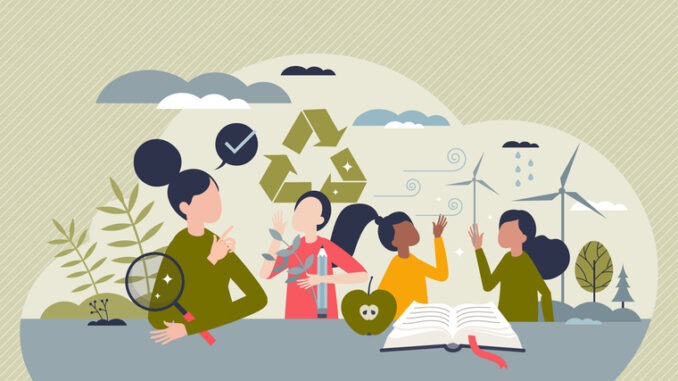
In this article, the UK Schools Sustainability Network (UKSSN) explores the critical role schools play in shaping the next generation’s approach to sustainability
Sustainability has emerged as a crucial aspect of our collective future. Schools, as pivotal institutions in society, have a unique opportunity to influence the next generation’s mindset and behaviours regarding sustainability. Leora Cruddas stated in CST’s Systems of Meanings, that leaders have a duty to engage with each other and other civic actors for the wider good. In addition, research supports this. A review of research into exemplary practice in whole school approaches to sustainability by Wals and Mathie (2022) demonstrated that connecting vision, ethos, leadership and strategy with curriculum, teaching and learning, operational practices, capacity building and forging community connections results in successful and sustainable practice.
In short, sustainability in schools must be what we do, what we say and how we relate to each other both inside and outside the classroom. This authentic approach will in turn remove any disconnect between what the students feel and experience. Especially important as it has been found that learning is less effective if pupils don’t feel safe, secure and calm. We know that climate anxiety in pupils is a real and growing phenomenon, a 2022 Save the Children survey stated that 70% of 12–18-year-olds in the UK are worried about the world they will inherit, they feel hopeless about the climate crisis. Therefore, the climate crisis is a mental health crisis, therefore a whole school or Trust approach to climate and sustainability with everyone working collaboratively to achieve the same goals is vital as the climate crisis accelerates.
The DfE’s Sustainability & Climate Change strategy references how “We have a valuable opportunity to drive change by introducing children and young people to more sustainable practices, such as, the circular economy, waste prevention and resource efficiency. We can inspire and instil habits that they will take into their wider communities and adult lives. Sector representatives have also confirmed that they have had the greatest results in driving sustainability in their operational processes when action has been linked to learning.”
We need staff and pupils to not just know sustainability but to change and act on their behaviour and choices.
How to Bring Ops Into the Classroom?
It’s having the right culture and creating the right engagement. Here is one Trust’s approach:
In the 2024 academic year, the ‘St Bart’s Super Gang’ will be working heroically to support pupils in sharing information about sustainability and climate change.
- Super Billy will be flying in to help us reduce waste and increase recycling
- Aqua Maria will be teaching us about water efficiency
- DJ Volts will be inspiring us to save energy by turning things off
- Mr Carrot will be helping us to avoid food waste and encouraging healthy eating
- And Bio-Fly will be encouraging us to enhance the biodiversity in our school grounds
St Bart’s pupils designed the sustainability superheroes to engage the SBMAT community in sustainability and climate change and to provide a mechanism for developing understanding and embedding behavioural change.
In the coming academic year, the characters will be used as part of SBMAT’s food waste reduction strategy in conjunction with their catering partners. They will also be used in Trust wide water, waste and energy saving projects as part of the St Bart’s pupil enrichment programme. They will build on the collaborative work undertaken by estates, finance, teaching staff and pupils to reduce their impact on climate and environment.
This holistic approach ensures that sustainability initiatives are understood by all stakeholders, with all contributions valued and successes celebrated. Using the sustainability characters ensures that the profile of the work is high and encourages involvement from parents, contractors and visitors to the schools.
The focus for each term is spearheaded by their pupil parliament, with representatives from each academy. Trustees, executive leaders and members of the central team, including estates staff attend the meetings to share their work with the pupils and hear pupil’s voices, which are then fed back to all teams and the trust board. This approach fosters positive relationships across the trust, for example Estates staff report that they feel more connected with the schools as a result and the central operations team have a clear understanding of the things that are important to the pupils.
What Next?
Consider Your School or Trust’s Culture
How can you influence making it open to sustainability and bringing ops into the classroom?
Engage with Leadership and Your School’s Climate Action Plan
Engage with others: suppliers – to add social value to your community, providing CPD for staff; community volunteers – within the school; widen your network – Join UKSSN Ops Gr and or a local network of schools. Share your case studies
Engage with Initiatives and Experts
National Education Nature Park, Climate Leaders Award, Energy Sparks, Climate Ambassadors and Climate Action Advisors


Be the first to comment